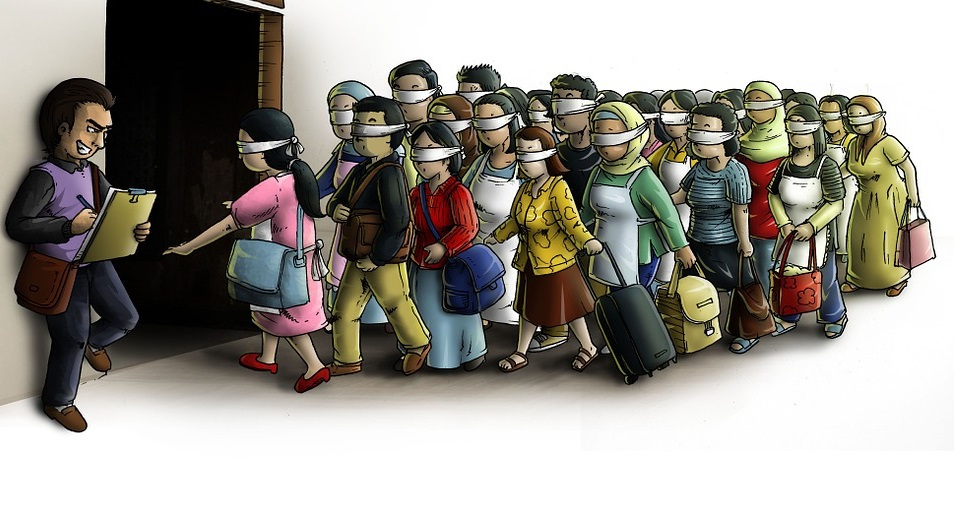Take capital to workers, not workers to capital

(short version) The west used to provide aid, taking capital to workers and building social stability in developing nations; now, after America’s destabilising “war on terror”, workers are forced to leave home for capital-rich countries, as refugees or migrant labour.
“In the pre-9/11 period, there was a Development Aid System (DAS) of transferring capital from rich to poor countries to encourage economic and social transformation. It was designed to take capital to labour. Its effect was to retain labour in its own environment. Now, it is a system that has broken down.
A very fragile deal was announced on 29 June by EU leaders to set up voluntary migration centres on EU land, but the details are yet to be determined. Major divisions within the EU persist. Some critical voices are labelling the proposed centres “migrant prisons.”
The Union stands at a cross-roads: its survival depends on finding a sustainable solution to the migration crisis. That solution points to restoring DAS.
The War on Terror has upset the DAS. In the name of security, aid funds have been reallocated to fighting terrorism on the home front as well as globally. But terrorism still defies a clear, universal definition. This fight has spawned all kinds of regional and ideological conflicts, especially in the poorest regions. In the process, the underclass in Africa, Asia, Central and Latin America has multiplied. The migrant, escaping oppression, violence and injustice, is the victim.
In soft states, without effective capacity or adequate public resources, enforcement even of minimal social safety nets, (e.g. minimum wages), has disappeared. With worsening living conditions on plantations and in shanty towns, illegal or criminal gangs often replace weak governments in the provision of basic public goods. These gangs are arbitrary and rely on violence and extortion. Refugees seek exit from injustice and insecurity, relying on human traffickers, not by choice but lack of it.
These are the harsh push factors of the exodus of migrants. From biblical times to present, migration has always been a push and pull story of oppression and the promised land.
The EU cannot be isolated or cut off from the rest of the world. If we think in terms of the highly popular Swedish movie, Square, with Europe behind walls, living in luxury and prosperity, then the inner logic of unsustainability becomes clear: How can the prosperity of people within the Square last when it depends vitally on imports of hydrocarbons, bananas, coffee and all sorts of other commodities from the periphery? Especially when the pricing of such imports is unfair.
Take, as just one example, the earnings of banana plantation workers. Their take-home pay represents less than 1% of the retail price consumers pay in rich country supermarkets. Where does the banana trade revenue go? Mostly to middlemen and corporate chains. The EU treasury gets up to a third of the revenue in tariff. In producing countries, unfair working conditions on plantations include modern forms of slavery and total lack of social safety-nets normally taken for granted in developed economies.
What can be done? Take capital to where labour is. Start reinvesting in development in poor countries. Germany (now 0.7 percent with spending on refugee integration included) and other rich EU members must pay generously, well above 1% of their GDP, to show the way toward a new era of rebuilding global equity.
It is now painfully clear that the US-led War on Terror was a big failure. It has not made the world a safer place. On the contrary it has increased insecurity and conflict. More spending on security, police and prisons has been a waste of resources, especially when these have been reallocated from development at the expense of investment in poor countries. It is cruel now to punish the victims as migrants at the gates of the rich world.
In contrast, it is instructive to look at the Turkish example of hosting migrants. Using largely its own resources, Turkey has provided housing, education and social services to almost 3.5 million persons displaced and relocated by war and conflict in neighboring countries, principally Syria. This is an impressive process of integration from which several European countries might benefit. In the meantime, President Erdogan has cashed in benefits in his recent re-election from migrants, many Turkish citizens now.
Merkel’s Germany, too, favourably looked at the inflow of migration, viewing it as a supply of cheap labour for skills upgrading in a period of labour shortage. In future, this will provide comparative advantage to German industries and exports.
In 2018 only 56,000 migrants have arrived in Europe so far compared with more than a million in 2015. This is significantly due to control by Turkish authorities in line with the EU-Turkey deal on migration. Amazingly, EU pledges to deliver up to six billion euros aid to Ankara are still pending.
The EU must invest in migration control… massively and urgently. It is essential for global equity. It is imperative for its own survival.
If the Union wants a sustainable solution to its migration crisis, it must channel a healthy share of its tariff revenue from global commodity trade to finance development in labour-sending countries. In other words, stop migration at its origin by eliminating the push factors at source. Migration decisions are always economic: individuals and families, when they decide to move, are not irrational; they risk their lives for a chance at a better life abroad. When they choose to overpay human traffickers, they weigh the risks and dangers against expected benefits in a new land.
Clearly, there are no short-cuts. To its credit, the 29 June EU conclusions on migration call for increased investment in Africa to help the continent achieve a “sustainable socio-economic transformation” to raise African living standards. But that is just the start of the complete rethink that is required.”
Source: SocialEurope.eu, Ozay Mehmet, Ph.D (Toronto), Senior Fellow, Modern Turkish Studies, Distinguished Research Professor, International Affairs (Emeritus) at Carleton University, Ottawa, Canada.